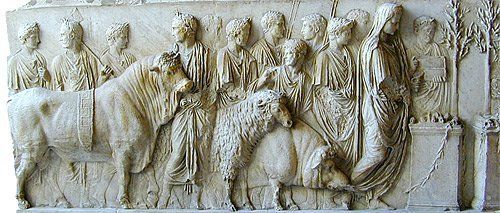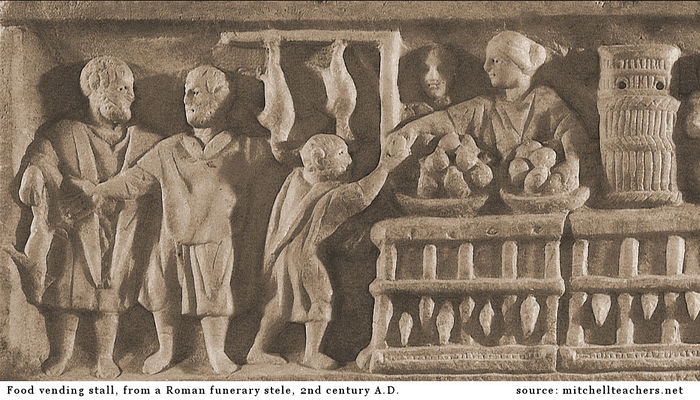Category:Idols & Images (subject)
Idols & Images
Overview
In a world dominated by polytheism, the major concern of Jews (and Christians) was to separate themselves from idols and idolatry. Not an easy task, as there was no separation between State and Religion.
Monotheism vs. polytheism
Letter of Aristeas 135-140 -- (135) ... all mankind except ourselves believe in the existence of many gods, though they themselves are much more powerful than the beings whom they vainly worship. For when they have made statues of stone and wood, they say that they are the images of those who have invented something useful for life and they worship them, though (136) they have clear proof that they possess no feeling. For it would be utterly foolish to suppose that any one became a god in virtue of his inventions. For the inventors simply took certain objects already created and by combining them together, showed that they possessed a fresh utility: they (137) did not themselves create the substance of the thing, and so it is a vain and foolish thing for people to make gods of men like themselves. For in our times there are many who are much more inventive and much more learned than the men of former days who have been deified, and yet they would never come to worship them. The makers and authors of these myths think that they are (138) the wisest of the Greeks. Why need we speak of other infatuated people, Egyptians and the like, who place their reliance upon wild beasts and most kinds of creeping things and cattle, and worship them, and offer sacrifices to them both while living and when dead.' (139) 'Now our Lawgiver being a wise man and specially endowed by God to understand all things, took a comprehensive view of each particular detail, and fenced us round with impregnable ramparts and walls of iron, that we might not mingle at all with any of the other nations, but remain pure in body and soul, free from all vain imaginations, worshiping the one Almighty God above the whole (140) creation. Hence the leading Egyptian priests having looked carefully into many matters, and being cognizant with (our) affairs, call us " men of God ". This is a title which does not belong to the rest of mankind but only to those who worship the true God.
Eating animals sacrificed to idols
The problem was not only the presence of temples and statues but extended also to food as many animals sold in the market came from sacrifices.
Paul addressed this problem in 1 Corinthians:
Paul, 1 Corinthians 10:14-33 -- 14 Therefore, my dear friends, flee from the worship of idols. 15 I speak as to sensible people; judge for yourselves what I say. 16 The cup of blessing that we bless, is it not a sharing in the blood of Christ? The bread that we break, is it not a sharing in the body of Christ? 17 Because there is one bread, we who are many are one body, for we all partake of the one bread. 18 Consider the people of Israel; are not those who eat the sacrifices partners in the altar? 19 What do I imply then? That food sacrificed to idols is anything, or that an idol is anything? 20 No, I imply that what pagans sacrifice, they sacrifice to demons and not to God. I do not want you to be partners with demons. 21 You cannot drink the cup of the Lord and the cup of demons. You cannot partake of the table of the Lord and the table of demons. 22 Or are we provoking the Lord to jealousy? Are we stronger than he? 23 "All things are lawful," but not all things are beneficial. "All things are lawful," but not all things build up. 24 Do not seek your own advantage, but that of the other. 25 Eat whatever is sold in the meat market without raising any question on the ground of conscience, 26 for "the earth and its fullness are the Lord's." 27 If an unbeliever invites you to a meal and you are disposed to go, eat whatever is set before you without raising any question on the ground of conscience. 28 But if someone says to you, "This has been offered in sacrifice," then do not eat it, out of consideration for the one who informed you, and for the sake of conscience-- 29 I mean the other's conscience, not your own. For why should my liberty be subject to the judgment of someone else's conscience? 30 If I partake with thankfulness, why should I be denounced because of that for which I give thanks? 31 So, whether you eat or drink, or whatever you do, do everything for the glory of God. 32 Give no offense to Jews or to Greeks or to the church of God, 33 just as I try to please everyone in everything I do, not seeking my own advantage, but that of many, so that they may be saved.
References
- Idols and Images / Johannes Tromp / In: The Eerdmans Dictionary of Early Judaism (2010 Collins / Harlow), dictionary, 758-759
- Idolatry / Brook W.R. Pearson / In: Dictionary of New Testament Background (2000 Evans & Porter), dictionary, 526-529
- / [[]] / In: The Anchor Bible Dictionary (1992 Freedman), dictionary,
External links
Pages in category "Idols & Images (subject)"
The following 15 pages are in this category, out of 15 total.
1
- Holy Images (1940 Bevan), book
- Jewish Symbols in the Greco-Roman Period (1953-1968 Goodenough), book
- Iconography of Religions: An Introduction (1977 Moore), book
- Jewish Symbols in the Greco-Roman Period (1988 Goodenough/Neusner), book (abridged ed.)
- Bild und Cult (1990 Belting), book
- Likeness and Presence (1994 Belting / Jephcott), book (English ed.)
- L'image interdite: une histoire intellectuelle de l'iconoclasme (1994 Besançon), book
- No Graven Image?: Israelite Aniconism in Its Ancient Near Eastern Context (1995 Mettinger), book
- The Image and the Book (1997 Toorn), edited volume
- Запретный образ Интеллектуальная история иконоборчества (1999 Besançon / Rozanov), book (Russian ed.)
2
- The Forbidden Image (2000 Besançon / Todd), book (English ed.)
- Art and Judaism in the Greco-Roman World: Toward a New Jewish Archaeology (2005 Fine), book
- Idolatry: False Worship in the Bible, Early Judaism, and Christianity (2007 Barton), edited volume
- The Sculptural Environment of the Roman Near East (2008 Eliav, Friedland & Herbert), edited volume
- Sculpting Idolatry in Flavian Rome: (An)Iconic Rhetoric in the Writings of Flavius Josephus (2011 Ehrenkrook), book

